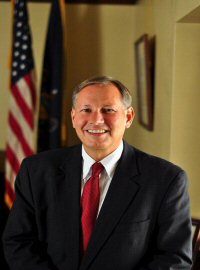Pennsylvania state senator offers paycheck protection ‘compromise’

By Andrew Staub | PA Independent
HARRISBURG, Pa. — A leading proponent of paycheck protection legislation in Pennsylvania says he’s found a “fair compromise” to alleviate union concern about the proposal that would force labor organizations to collect their own political money.
State Sen. John Eichelberger, R-Blair, said an amendment to his legislation, Senate Bill 1034, would still allow public-sector union employees to have fair-share fees — which pay for representation in collective bargaining, arbitration and legal matters — automatically deducted from their paychecks.
The portion of union dues that go toward advocacy and any political action committee contributions, though, no longer would be taken out automatically through the government payroll system, as is the case now. Eichelberger’s original legislation would have also barred the fair-share deduction.
COMPROMISE REACHED: Pennsylvania state John Eichelberger believes allowing fair shares to be deducted is a fair compromise when it comes to paycheck protection.
“We’re hoping that the unions will understand that this is a true compromise,” Eichelberger said.
The Senate State Government Committee approved the amended legislation Thursday. Eichelberger said it still accomplishes the goal of stopping public resources from being used to collect political contributions, while attempting to address union worries that conservatives just want to shut them down.
It didn’t work.
Rick Bloomingdale, president of the Pennsylvania AFL-CIO, scoffed at the idea the change is a “compromise.” He said it was “fraught” with First Amendment issues.
“It’s actually even worse,” he said. “It’s really Big Brother deciding what you can and can’t do with your paycheck.”
In a statement released through the Service Employees International Union Pennsylvania State Council, Jeff Seabury, a SEIU 668 member and Uniontown resident, said he was “outraged” at the effort to pass paycheck protection.
“This misleading legislation is really an effort to roll back the rights and protections of middle class families in Pennsylvania. We cannot allow this to happen,” he said.
Paycheck protection has been a political fire-starter all year, even as the legislation sat idle in both chambers. Union workers railed in the Capitol Rotunda, conservative groups aired television ads and debate over the legislation spilled onto the Senate floor.
This week the bills saw action. It started Monday with the House State Government Committee making a similar amendment to its version of paycheck protection legislation.
Eichelberger said Thursday the change to his legislation “helps us get the votes.” He also acknowledged that the firefighters and police officers covered under a state law barring them from striking were exempted from the legislation in part to help corral votes, too.
Eichelberger said he hopes the legislation will get a vote before lawmakers break for the summer. But state Sen. Matthew Smith, D-Allegheny, argued that the General Assembly has more pressing business, like passing a state budget by Monday’s deadline.
Smith raised the oft-mentioned argument that health care costs and charitable deductions can be automatically deducted from employee’s paychecks. In many cases, even those charities conduct advocacy work, Smith said, questioning why labor organizations should be treated differently.
“I think we’re picking winners and losers,” Smith said.
A change in law is unnecessary, Smith contended, because public-sector union employees can already choose to just pay the fair-share fee. The paycheck protection legislation would place a burden on employees who would have cut a check to pay the portion of union dues that can be used for advocacy, he said.
Eichelberger countered that it’s about removing official resources from political activity, not whether employees are OK with the activity.
The Commonwealth Foundation, a conservative think tank in Harrisburg, was happy to see the legislation move ahead.
“The original purpose and intent was to get public money out of subsidizing other people’s politics,”
said Commonwealth Foundation President and CEO Matthew Brouillette. “This amendment here accomplishes that objective.”
Contact Andrew Staub at Andrew@PAIndependent.com. Follow @PAIndependent on Twitter for more.







